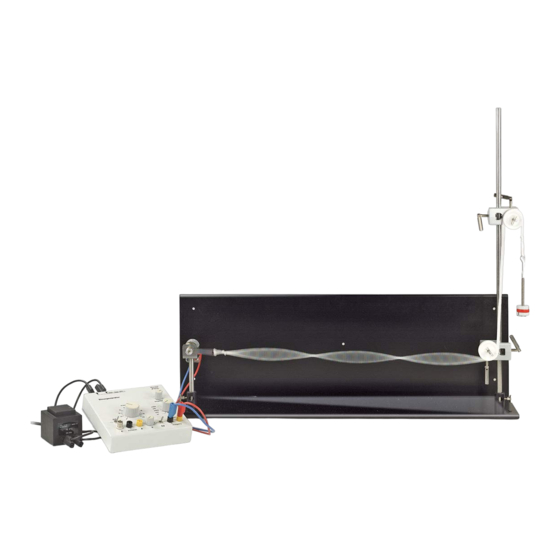3B SCIENTIFIC PHYSICS U8431776 Anleitungsblatt - Seite 4
Blättern Sie online oder laden Sie pdf Anleitungsblatt für Laborausrüstung 3B SCIENTIFIC PHYSICS U8431776 herunter. 3B SCIENTIFIC PHYSICS U8431776 12 Seiten. Apparatus for demonstrating waves along a cord

3. Operation
The following additional equipment is needed to
carry out the experiments:
1 DC motor
1 Sine-wave generator
1 Transformer, 12 V, 25 VA
or
1 Transformer, 12 V, 25 VA
Experiment leads
3.1 Setting up
•
Set up the experiment as shown in Figure 1.
•
Insert the DC motor into the left-hand rod
socket and secure it.
•
Screw the two stand rods together, insert into
the right-hand socket, and secure them.
•
Fix the two universal clamps to the rods.
•
Push the pulley onto an axle-rod, secure it with
the axle clip, and fix it in the lower universal
clamp.
•
Fix the second axle rod in the upper universal
clamp and suspend the dynamometer from it.
•
Attach the elastic cord to the DC motor, pass it
under the pulley then up to attach it to the
dynamometer.
•
Adjust the height of the pulley so that the
elastic cord runs parallel to the base-plate.
Elwe Didactic GmbH • Steinfelsstr. 6 • 08248 Klingenthal • Germany •
3B Scientific GmbH • Rudorffweg 8 • 21031 Hamburg • Germany •
U8552330
U8533550
U8475430-230
U8475430-115
Fig. 1 Experiment set-up
Subject to technical amendments
© Copyright 2008 3B Scientific GmbH
•
Connect the DC motor to the sine-wave
generator and connect the latter to the
transformer.
3.2 Experiment procedure
•
Set switches S2 and S3 of the sine-wave
generator to the "generator" position (right).
•
Apply no tension to the cord other than by
means of the dynamometer.
•
Adjust the frequency of the sine-wave
generator until a standing-wave vibration with
four peaks and troughs (two each) settles in.
Use the amplitude control to make fine
adjustments.
The wavelength is now half the length of the cord.
•
Move the dynamometer higher up the rod until
the tension is four times the previous value.
The band now vibrates with just one peak and one
trough. The wavelength is therefore equal to the
length of the band.
The following parameters are found to give good
results:
Frequency: 42-43 Hz, initial cord tension: 0.5N.
www.elwedidactic.com
www.3bscientific.com
